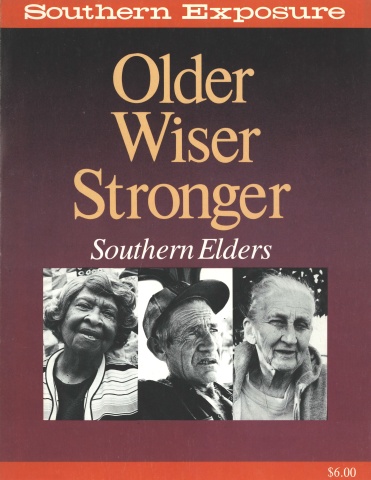Readers Corner: This Old Lady

This article originally appeared in Southern Exposure Vol. 13 No. 2/3, "Older Wiser Stronger: Southern Elders." Find more from that issue here.
Elizabeth Cousins Rogers was born in 1891 in Aurora, New York and died in 1985. After a privileged upbringing, she graduated from Smith College in 1913, served in the Red Cross canteen service in France in World War I, and worked for a time as an editor at Vogue magazine. She was a member of the Writers' Work Project in the 1930s and taught labor union journalism at Commonwealth College in Mena, Arkansas in the Depression years. There she met her husband, Walter Rogers, and for the next 40 years the two worked as union organizers and spokespeople for progressive causes. They became, in their term, "street journalists," leafletting as a means of getting their politics out to the people (see Southern Exposure, March/April 1982).
After Walter's death in 1981, Elizabeth continued the work. She wrote, compiled, and distributed Songs for the Sidewalk, an anthology of their protest songs. At the time of her death, February 18, 1985, Elizabeth Rogers had nearly completed her autobiography, From Right to Left in 90 Years. Executors of her estate plan to complete and publish the book. She died as she lived: determined, proud, and committed to her beliefs.
If you ask this old lady how she's doin', I'll likely give you a big smile and reply, "Well, my new eye doesn't see much yet, my teeth don't chew, I have sharp knife pains in my leg. Otherwise, for a 93-year-old, I'm just fine."
I have lived alone since my husband Walter Rogers died four years ago. Thirty years ago "Rog" and I, a white couple, came from a mixed neighborhood in the Vieux Carré to a black neighborhood here in the Ninth Ward of New Orleans. A lot 36 feet by 110 feet could be bought then for $750, built on, lived on. We never regretted the move. With a few dreadful exceptions, which could have happened anywhere, we've got on well with our neighbors. Some even have loved us and invited us to weddings as the young folk grew up.
This old lady is big friends with the latest batch of youngsters in the block, as with those before them. They wash my car, which I drove until the latest cataract operation and hope to drive again. They cut my grass, carry in my groceries. In return, there's a tangerine, cookies, or ice cream served on the steps. The boys take particular pride in walking my two black dogs on leads. They're black with mahogany legs, "thoroughbred mutts," I call them, trained to jump through a hoop, too.
Today is a kind of peak day. The dogs need food; so do I. There's little cash on hand; my $300 Social Security check lies in a drawer, uncashed for three weeks because of no transportation. The $365 savings in my check book is due now for house insurance.
This old lady is living to finish her memoirs. I need to get to my safe-deposit box for certain dates of transatlantic crossings, divorce, an old photo. "Looks like the only way is Shanks's mare!" I tell the wagging dogs.
Carrying a tote bag, a folding stool, a nonfolding cane, I board a Galvez bus one block from home, headed toward the city. I ride about eight blocks, dismount, wait on my stool for a while, then board the Caffin bus going toward the river and finally get off at St. Claude, where the grocery is.
Eight loaves of long French bread — a week's dog food. For my shaky, aching teeth, soft foods: bananas, tomatoes, cake, sausage, lots of cuppa-soups. Add cod-liver oil, and roach pills for around the sink. Balancing these additions to my already heavy travel equipment, I use my bus transfer to reach the little bank on St. Claude, halfway to Canal Street. After cashing my check and obtaining my historical records, I cross the street to catch a bus headed back to the Ninth Ward. It carries me across the bridge over the Canal.
Here there's a wait of nearly an hour for the shuttle bus to come back from the river. Bless you, my good stool! After rides on two more buses, I am finally deposited one block from my door, where I boarded the first bus five hours ago.
All through my difficult safari, kind black strangers have waited to help me on and off the buses with my clumsy load. Happily, I tell myself, "This couldn't have happened when we came here in the '50s. Thanks be to Rosa Parks, Fannie Lou Hamer, the white and black youth of the Summer Project! Thanks to the 'New Orleans four,' six-year-olds backed by an entire neighborhood who dared to break the color line in New Orleans public schools; and thanks to far-seeing Martin Luther King, Jr. — and now to Jesse Jackson, giving the Pentagon some quiet lessons in world diplomacy!"
At sight and sound of me, the dogs throw themselves joyously against the reinforced screen door of the kitchen. "Down, down, mahogany legs! Don't you know five hours on the go like this just about tuckers me out?" Sitting obediently, they watch me saw slices of the poor-boy bread, saving the tough ends for "bones." Their supper of bread, oatmeal, succulent raw cabbage, and a handful of tasty dog food bitlets is swiftly gobbled. Now comes their daily peak 10 minutes: they're tossed the tough ends to tear, crouched like wolves, tails between tight haunches, growling as they chew.
Quietly, this old lady drinks her soup, puts away the money and the documents, and goes to bed. In a day or two, I'll get back energy enough to use them.